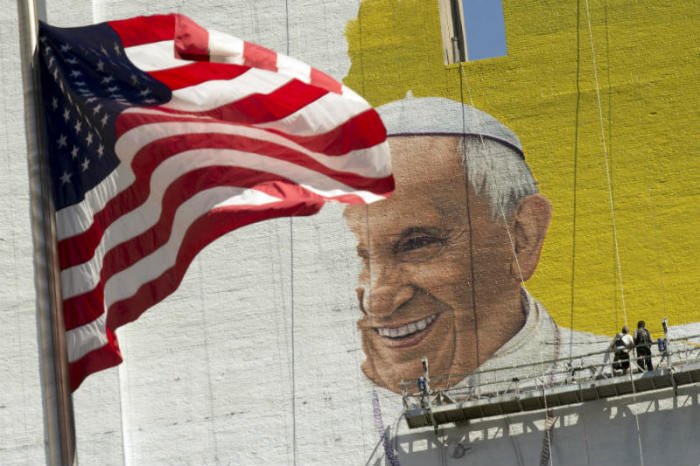Avoid 'Evil' Act of Helping Pope Too Much During US Visit, Church-State Separation Group Warns Local Governments

Lawyers from Americans United for Separation of Church and State are warning public officials in New York City, Philadelphia and Washington, D.C. that extensive preparation at taxpayers' expense for Pope Francis' visit later this month is a violation of the U.S. Constitution. Quoting an appeals court ruling, such aid is the type of "specific evil" the First Amendment "was designed to prevent," the group said.
The organization, which advocates for a strict separation view of the religious freedom clauses of the First Amendment, sent a letter to the mayors of the respective cities and the heads of the Secret Service, National Park Service and the Southeastern Pennsylvania Transportation Authority on Monday "to provide guidance on the constitutional limitations on governmental support of and involvement with the papal visit."
"Specifically, government bodies must not provide any aid to a Pope's religious activities that goes beyond the provision of services — such as police, safety, and security — that are regularly given for comparable public events of a similar size," states the letter, which was signed by the group's legal director Alex Luchenitser and legal fellow John McGinnis.
"That is because the Establishment Clause of the First Amendment to the U.S. Constitution prohibits government bodies from taking any action that communicates a message of endorsement of religion," the letter continued. "The Establishment Clause thus prohibits the provision of public aid for religious activity, such as worship or religious instruction … Nor may government funds be used to pay for items that are themselves secular, but are used to support religious programming."
As the Pope's visit to the U.S. is scheduled to run from Sept. 22 through Sept. 27, the World Meeting of Families is also scheduled to take place in Philadelphia from Sept. 21 through Sept. 25. The letter cites concerns over plans being made by the city of Philadelphia to prepare for the events.
The letter explains that the city intends to impose travel restrictions during the Pope's visit and the World Meeting of Families that will cause a part of the city to be turned into a "travel box," which vehicles will not be permitted to reenter once they leave. Additionally, certain bridges and streets will be closed off while city offices and public schools will be closed. Limited government services will be offered and trash service will be suspended.
The letter also complains about intentions by SEPTA, Philadelphia's public transit system, to accept one-week passes that are available through registration with the World Meeting of Families. During that time, regular one-week or long-term passes will not be accepted, and those not participating in the conference will only have access to regional rail.
"Although the pope is considered a head of state, he is in a unique position because he also leads a major religious group," the Rev. Barry W. Lynn, executive director of Americans United, said in a statement. "As a result, government officials must be very careful not to spend taxpayer dollars for any of the pope's religious activities while he is in the United States."
Americans United specifically cites a ruling in a U.S. Court of Appeals case in 1980 that found that the city of Philadelphia violated the Establishment Clause by spending over $200,000 in taxpayer money to build a platform, rent chairs and a sound system for Pope John Paul II's papal mass at Logan Circle in 1979.
"The court noted that these were 'extraordinary expenditures, all a kind never offered to other organizations, religious or non-religious,'" the letter reads. "The court explained that the aid 'connote[d] the state approval of a particular religion, one of the specific evils the Establishment Clause was designed to prevent.'"
Although the court condemned the Philadelphia's use of taxpayer funds to provide a stage and amenities for the papal visit in 1979, the appeals court upheld Washington, D.C.'s provision of police protection, crowd control, utilities and trash collection services for the 1979 papal mass at the National Mall.
"The court explained that the expenditures incurred by the government were 'no different from those regularly incurred with any large public gathering, and a comparable level of services and facilities would be extended by the [government] to any group of similar size which possesses a permit to use [the] land,'" the letter explains.
Luchenitser said in a statement that the organization will monitor actions taken by the city governments to ensure that they are held accountable for any violation that they may commit.
"City and federal officials should take care not to repeat the unconstitutional mistakes that were made during past papal visits," Luchenitser said. "We'll be watching them to ensure that they do not do so."





























